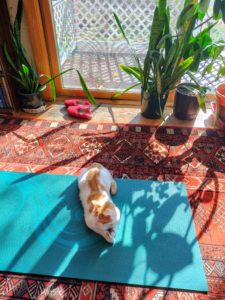My 20-month old grandson, Manu, has become obsessed with his dreidel, a toy top typically played with on the Jewish holiday of Hanukkah for “gelt,” which are coins or coin-shaped pieces of chocolate.
But Manu doesn’t know about chocolate, yet. And he’s shown no interest in the letters on the dreidel, which traditionally determine whether you win or lose, depending on where the dreidel lands. In fact, he rarely waits for the dreidel to land. For him, the joy is in the spinning.
“Spin it here!” he shouts, trying out his toy stove, my knee, the couch, the piano. “Grandma, spin it!”
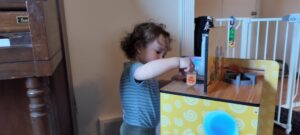
Photo by Shel Horowitz
I never knew a dreidel could spin so well on upholstery.
He also tries places that never work: the curved handle on the umbrella stroller, the side of the bookshelf, the pointy roof of a Lego block. There is a thing called gravity–LOL.
But Manu doesn’t mind at all. He picks up the fallen dreidel and hunts around for another cool place to launch an attempted spin.
His optimism is a good lesson in not being afraid to try out what might seem impossible. This week I took my first tentative steps toward diving into a longer project, another YA novel. Writing bland and sketchy prose, I tried to let the characters in my head take their first few breaths on stage, figuring they’d reveal more about who they really were when they got to trust me–and I, them. My five handwritten pages are looking very much like the beginning of a “shitty first draft,” as coined by Anne Lamott in her wonderful book, Bird by Bird—a must-have for any aspiring (or semi-established) writer.
And from Manu’s perseverance I’ve learned something about approaching work that’s past the “shitty-first-draft” stage. Just as he refuses to be put off by places the dreidel won’t spin, I need to do a better job on not giving up so quickly on places where my writing doesn’t sing. Often I can substantially improve a piece by finding a better verb (or sometimes noun or adjective). If a word sounds flat to me–either too overused, not clear enough, or having a sound that clashes with everything else, I can painstakingly search for a word that comes closer to what I’m seeking. And I’m not at all ashamed to admit that my best buddy in this process is a fabulous on-line thesaurus called wordhippo.com, which breaks each word down to its possible meanings, and gives quick and clear definitions of the alternative selections to prevent me from falling further into the muck.
Who would have thought I could have learned so much from spinning a dreidel. I guess, as the words on the dreidel say–a great miracle happened here.

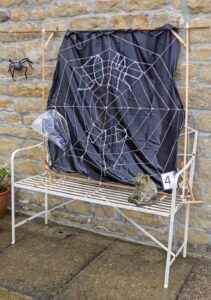

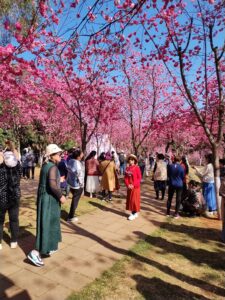 Though being forced to write was a good thing, I have to admit I regretted not getting the immediate gratification of people’s reactions to the cherry blossoms in Kunming, or my musings on Substack, which made me wonder–what is it about we humans in the social media age that makes us feel that everything we do needs to be immediately validated? True confessions, I am one of those people who obsessively looks for likes and feedback for anything I post on the big cyber cloud. Sometimes I worry that this has a negative impact on my writing–whether in sharing groups, I’m too quick to read something half-finished, simply for the joy of hearing people’s reactions to it. But I do like to think that reading things out loud, even early drafts, sharpens my own ear for what’s working or not working in a piece. In fact, one of my favorite revision techniques is to read a piece out loud even if I’m the only person listening.
Though being forced to write was a good thing, I have to admit I regretted not getting the immediate gratification of people’s reactions to the cherry blossoms in Kunming, or my musings on Substack, which made me wonder–what is it about we humans in the social media age that makes us feel that everything we do needs to be immediately validated? True confessions, I am one of those people who obsessively looks for likes and feedback for anything I post on the big cyber cloud. Sometimes I worry that this has a negative impact on my writing–whether in sharing groups, I’m too quick to read something half-finished, simply for the joy of hearing people’s reactions to it. But I do like to think that reading things out loud, even early drafts, sharpens my own ear for what’s working or not working in a piece. In fact, one of my favorite revision techniques is to read a piece out loud even if I’m the only person listening.

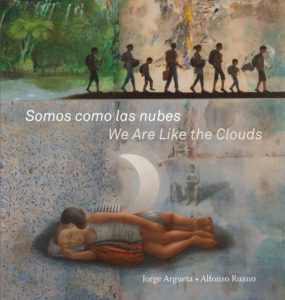
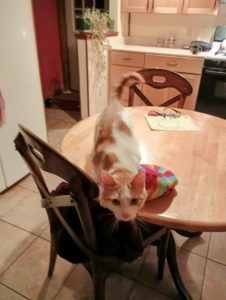
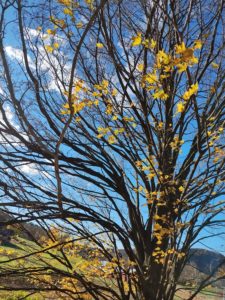 look at things differently. Even today, when I sat down to try to write Poem #9 and came up empty (so I started to write this blog post instead), I found myself intrigued by the leaves’ dance outside my window in that brilliant, but all-too-fleeting sun.
look at things differently. Even today, when I sat down to try to write Poem #9 and came up empty (so I started to write this blog post instead), I found myself intrigued by the leaves’ dance outside my window in that brilliant, but all-too-fleeting sun.